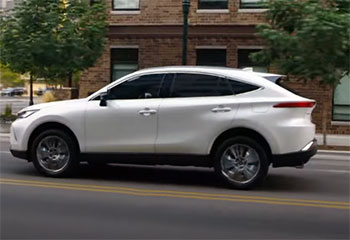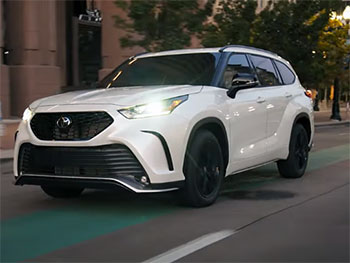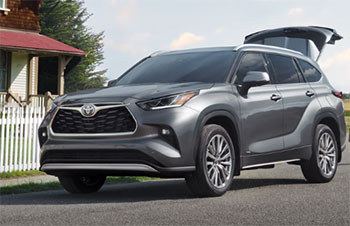As a car enthusiast who’s spent countless hours behind the wheel, I’ve always been drawn to Toyota’s SUVs for their reliability and versatility. When it came time to choose between the 2024 Toyota Venza and the 2025 Toyota Highlander, I found myself weighing their unique strengths for my lifestyle.
In this article, I’ll share my firsthand experience comparing these two SUVs, breaking down their pros and cons, key features, and which one might suit you best. Whether you’re a family driver or a fuel-efficiency seeker, this comparison will help you decide.
Toyota Venza Vs. Toyota Highlander Comparison
| Feature | Toyota Venza (2024) | Toyota Highlander (2025) |
|---|---|---|
| Starting MSRP | $35,070 | $39,270 |
| Powertrain | Hybrid-only (2.5L 4-cylinder, 219 hp) | Gas (2.4L turbo, 264 hp) or Hybrid (243 hp) |
| Fuel Economy | 40 MPG city / 37 MPG highway | Gas: 22 MPG city / 29 MPG highway; Hybrid: 36 MPG city / 35 MPG highway |
| Seating Capacity | 5 passengers | Up to 8 passengers |
| Cargo Space | 28.8 cu-ft (seats up) / 55.1 cu-ft (folded) | 16.0 cu-ft (seats up) / 84.3 cu-ft (folded) |
| Towing Capacity | Not rated | Up to 5,000 lbs (gas models) |
| Drive Type | All-wheel drive (AWD) standard | Front-wheel or all-wheel drive |
| Safety Features | Toyota Safety Sense 2.5+ | Toyota Safety Sense 2.5+ |
| Infotainment | 12.3-inch touchscreen (XLE, Limited) | 12.3-inch touchscreen (Limited, Platinum) |
| Warranty | 36 months/60,000 km comprehensive | 36 months/60,000 km comprehensive |
My Experience With the Toyota Venza

I first slid into the driver’s seat of the 2024 Toyota Venza on a crisp morning, eager to see if its sleek design and hybrid efficiency lived up to the hype.
The Venza, a midsize two-row SUV, immediately struck me with its polished, almost Lexus-like aesthetic.
Its smooth lines and tapered roofline gave it a sporty, urban vibe, perfect for navigating city streets or weekend getaways.
The hybrid powertrain, delivering 219 horsepower, felt peppy enough for daily commutes, and the standard all-wheel drive (AWD) added confidence on slick roads.
I was impressed by the quiet cabin, thanks to its hybrid system and noise-reducing glass, making it a serene escape from bustling traffic.
Driving the Venza felt effortless, with a CVT transmission that delivered smooth acceleration, though it could feel slightly sluggish when merging onto highways. The interior was a highlight—premium materials, a 12.3-inch touchscreen on higher trims, and the optional Star Gaze panoramic sunroof that shifts from transparent to opaque at the touch of a button.
It’s a cool feature that made me feel like I was in a luxury vehicle. However, the cargo space (28.8 cubic feet with seats up) was adequate but not outstanding, especially compared to competitors. For someone like me, who occasionally hauls camping gear, this was a slight letdown. The Venza’s focus on efficiency (40 MPG city) and comfort made it ideal for solo drivers or small families, but I wondered how it would stack up against the Highlander’s versatility.
My Experience With the Toyota Highlander

The 2025 Toyota Highlander, a three-row midsize SUV, felt like a different beast altogether.
I took it for a spin with my family in tow, testing its capacity to handle kids, groceries, and sports equipment.
The Highlander’s boxier design isn’t as flashy as the Venza’s, but it exudes practicality.
With seating for up to eight (or seven with captain’s chairs), it’s built for larger families or group road trips.
The gas model’s 2.4-liter turbo engine (264 horsepower) felt punchier than the Venza’s hybrid, and its 5,000-pound towing capacity was a game-changer for anyone needing to haul a trailer.
The Highlander’s interior was spacious, with 42 inches of front legroom and clever storage solutions, though the third row was tight for adults—better suited for kids. Its cargo space (16 cubic feet with all seats up) was smaller than the Venza’s, but folding the second and third rows opened up a cavernous 84.3 cubic feet.
The hybrid option, with 243 horsepower and 36 MPG city, was a compelling middle ground for efficiency and power. The Highlander’s ride was comfortable, though not as quiet as the Venza’s, and its higher price tag ($39,270 starting) made me pause. Still, its versatility and family-friendly features were hard to ignore.
Read More: My Thoughts On Acura MDX Vs. Lexus GX
Pros Of the Toyota Venza
- Exceptional Fuel Efficiency: The Venza’s hybrid-only powertrain achieves 40 MPG city and 37 MPG highway, making it a standout for eco-conscious drivers. I noticed significant savings on gas during my week-long test, especially in stop-and-go traffic where the hybrid system shines. Compared to the Highlander’s gas model (22 MPG city), the Venza is a clear winner for urban commuters.
- Sleek, Premium Design: The Venza’s exterior is a head-turner, with thin LED headlights and a coupe-like silhouette. Inside, the cabin feels upscale, with soft-touch materials and a modern layout. The Star Gaze panoramic sunroof, available on the Limited trim, added a luxurious touch that made every drive feel special.
- Quiet and Comfortable Ride: The Venza’s hybrid system and acoustic glass create a serene cabin. During my drives, road noise was minimal, making it ideal for long highway trips or city commutes. It’s noticeably quieter than the Highlander, especially at higher speeds.
- Standard All-Wheel Drive: Every Venza comes with AWD, providing excellent traction in rain or light snow. I tested it on a wet mountain road, and it handled curves confidently without sacrificing comfort.
- Advanced Safety Features: Toyota Safety Sense 2.5+ includes pre-collision braking, lane departure alert, and adaptive cruise control. These features gave me peace of mind, especially when navigating busy intersections. The system felt responsive and unobtrusive.
- Tech-Savvy Interior: The 12.3-inch touchscreen (standard on XLE and Limited trims) is crisp and user-friendly, with wireless Apple CarPlay and Android Auto. The optional 10-inch head-up display was a nice touch, keeping my eyes on the road.
- Competitive Starting Price: At $35,070, the Venza is more affordable than the Highlander, making it an attractive option for budget-conscious buyers seeking hybrid efficiency and premium features.
The Venza’s blend of style, efficiency, and tech made it a joy for solo drives or small families. Its compact size (186.6 inches long) made parking a breeze, and the hybrid system kept my fuel costs low. However, its strengths are tailored to specific needs, which I’ll explore further in the cons.
Cons Of the Toyota Venza
- Limited Cargo Space: With 28.8 cubic feet behind the rear seats, the Venza’s cargo area is smaller than competitors like the Honda Passport or even the Toyota RAV4 Hybrid (37.6 cubic feet). I struggled to fit larger items like a stroller without folding the seats, which could be a dealbreaker for families needing more storage.
- No Towing Capability: Unlike the Highlander, the Venza isn’t rated for towing. This was a disappointment when I considered weekend projects like hauling a small trailer. If towing is a priority, the Venza falls short.
- Sluggish Acceleration: The 219-horsepower hybrid powertrain is efficient but lacks the punch of the Highlander’s turbo engine. Merging onto highways felt underwhelming, and the CVT transmission’s drone was noticeable during hard acceleration.
- Smaller Rear Legroom: The Venza offers 37.8 inches of second-row legroom, less than the Highlander’s 38.7 inches. Taller passengers in the back complained about feeling cramped during longer trips, which could be an issue for families.
- Hybrid-Only Powertrain: While great for efficiency, the lack of a gas-only option limits flexibility. If you prefer a traditional engine or don’t need hybrid savings, the Highlander’s gas or hybrid choices are more versatile.
- Discontinuation in 2025: Toyota is replacing the Venza with the Crown Signia in 2025, which could affect resale value or parts availability down the line. This gave me pause when considering long-term ownership.
- Less Versatile for Large Families: With only five seats, the Venza can’t match the Highlander’s ability to carry up to eight passengers. For someone like me who occasionally needs extra seating, this was a significant drawback.
The Venza’s compact size and hybrid focus make it less practical for those needing robust utility or power. Its premium features are impressive, but the trade-offs in space and performance might steer some buyers toward the Highlander.
Pros Of the Toyota Highlander

- Spacious Seating for Up to Eight: The Highlander’s three-row configuration is a game-changer for families. I comfortably fit six adults and two kids during a group outing, with the option for captain’s chairs in higher trims adding a touch of luxury.
- Impressive Cargo Capacity: With the second and third rows folded, the Highlander offers 84.3 cubic feet of cargo space—far more than the Venza’s 55.1 cubic feet. I easily loaded camping gear, coolers, and bikes for a weekend trip.
- Powerful Turbo Engine: The gas model’s 2.4-liter turbo engine (264 horsepower) delivers strong acceleration and a 5,000-pound towing capacity. I towed a small boat effortlessly, something the Venza can’t do.
- Hybrid Option for Efficiency: The Highlander Hybrid’s 243 horsepower and 36 MPG city fuel economy strike a great balance. It’s not as thrifty as the Venza but offers more power for highway driving.
- Versatile Drive Options: Available in front-wheel or all-wheel drive, the Highlander adapts to different needs. I appreciated the flexibility, especially when switching between city and rural routes.
- Robust Safety Suite: Like the Venza, the Highlander comes with Toyota Safety Sense 2.5+, including lane tracing assist and road sign assist. These features were reliable during my drives, enhancing safety in heavy traffic.
- Wide Range of Trims: From the base LE to the luxurious Platinum, the Highlander offers six trims, giving buyers plenty of customization options. I found the XLE’s balance of features and price particularly appealing.
The Highlander’s versatility, power, and family-friendly design make it a top choice for those needing a do-it-all SUV. Its ability to handle everything from daily commutes to cross-country adventures is a major selling point.
Cons Of the Toyota Highlander
- Higher Starting Price: At $39,270, the Highlander is pricier than the Venza’s $35,070. This gap widened with higher trims, making it less budget-friendly for cost-conscious buyers like me.
- Lower Fuel Economy: The gas model’s 22 MPG city and 29 MPG highway lag behind the Venza’s 40/37 MPG. Even the hybrid’s 36 MPG city couldn’t match the Venza’s efficiency, which hit my wallet harder during testing.
- Tight Third Row: The third row is cramped for adults, with limited legroom (27.7 inches). I found it suitable only for kids or short trips, which could frustrate buyers expecting full-size seating.
- Noisier Cabin: Compared to the Venza, the Highlander’s cabin lets in more road and wind noise, especially at highway speeds. Swapping tires might help, but it was noticeable during long drives.
- Larger Size Impacts Maneuverability: At 194.9 inches long, the Highlander is less nimble than the Venza (186.6 inches). Parking in tight city spots was trickier, and I felt the extra bulk in traffic.
- Base Trim Feels Basic: The entry-level LE trim lacks the premium feel of the Venza’s base model, with an 8-inch touchscreen and fewer luxury touches. Upgrading to higher trims adds significant cost.
- Less Stylish Design: The Highlander’s boxy look is functional but lacks the Venza’s sleek, modern flair. For someone who values aesthetics, this was a minor letdown.
The Highlander’s size and versatility come with trade-offs in cost, efficiency, and style. It’s a practical choice, but not as refined or fuel-efficient as the Venza for smaller households.
Read More: My Thoughts On Acura MDX Vs. Jeep Grand Cherokee
Frequently Asked Questions (FAQ)
The Venza is a two-row, hybrid-only SUV with a focus on fuel efficiency (40 MPG city) and a sleek design, seating five. The Highlander is a three-row SUV with gas or hybrid options, seating up to eight, and offers more cargo space (84.3 cu-ft) and towing capacity (5,000 lbs). The Venza is more compact and stylish, while the Highlander prioritizes family utility.
Toyota discontinued the Venza after 2024 to introduce the Crown Signia, a new hybrid SUV with a similar midsize footprint but updated styling and features. The move aligns with Toyota’s strategy to refresh its lineup and compete in the premium SUV market.
The Venza has limited cargo space (28.8 cu-ft), no towing capability, and a hybrid-only powertrain that may feel underpowered. Its rear legroom (37.8 inches) is cramped, and its discontinuation in 2025 could impact resale value.
The Highlander Hybrid (36 MPG city, 243 hp) is better for those wanting efficiency without sacrificing seating or towing (3,500 lbs). The gas Highlander (264 hp, 5,000 lbs towing) suits those needing more power. Choose based on your priority: efficiency or performance.
Conclusion: For Toyota Venza and Highlander
Choosing between the Toyota Venza and Highlander depends on your lifestyle. If you’re like me, craving a stylish, fuel-efficient SUV for solo drives or small families, the Venza’s 40 MPG and premium cabin are hard to beat. Its compact size and quiet ride make it perfect for urban adventures, but the limited cargo and lack of towing might frustrate you if you need more utility. For larger families or those hauling gear, the Highlander’s spacious interior, eight-passenger seating, and 5,000-pound towing capacity make it the go-to choice. Its hybrid option balances efficiency and power, but the higher price and less refined design might not suit everyone. Test-drive both to see what fits your needs—you can’t go wrong with either, but the Venza’s efficiency and the Highlander’s versatility cater to different drivers.

